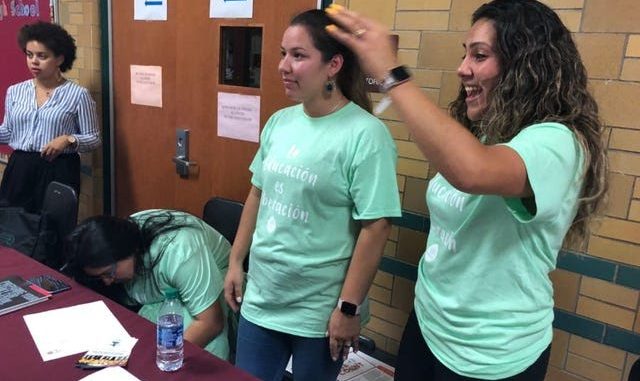
Leaders of Michigan’s largest school district have rolled out a new plan to protect immigrants’ rights on school grounds, saying immigration-related fears are seeping into the classroom and hurting student learning.
A week after the Detroit Public Schools Community District adopted new protections for immigrant families — and less than a month after federal officials arrested hundreds of migrants on the first day of school in Mississippi — officials took to the stage this week to answer questions about what it means to be a sanctuary district.
In short, officials from Immigration and Customs Enforcement and other federal enforcement agencies will no longer be allowed to enter district property without a search warrant, and schools won’t collect information related to students’ immigration statuses.
“We have drawn a line in the sand, to say that when children come into our schools, they are safe,” said Superintendent Nikolai Vitti, adding: “As superintendent, I’ll be the first to put myself at the front door to say, ‘You’re not coming in to our schools.’ ”
With the passage of a formal policy by the school board last week, the district’s legal team developed a protocol for school employees to follow. Principals will be trained on the new rules, including a requirement that they contact district administrators before allowing immigration officers into schools.
A similar policy is already in place in the Hamtramck School District, an enclave of Detroit. Districts in Miami, New York City, Des Moines, and Chicago have said they won’t cooperate with federal enforcement officials unless they have a warrant.
Urged by community members to take a more public stance, the district’s top officials spoke more forcefully about immigration than they have in the past.
“We want our students to come to school and focus on teaching and learning, and not on whether the federal government, or any kind of authority, is going to rip them out of their schools,” Vitti said to applause and whoops from the crowd at West International High School, which sits in the heart of a largely Spanish-speaking Detroit neighborhood.
By speaking out forcefully, Vitti risks federal retribution. President Donald Trump has repeatedly threatened to withhold funds from municipalities that refuse to work with immigration officials unless they have an active warrant. But those threats have largely proven empty.
“As time has progressed, it has become even more important for us to support the community,” said Misha Stallworth, a member of the board of education.
Concern that the national discourse on immigration will prove toxic to student learning is widespread among educators in Michigan. In a public letter published soon after Trump took office, then-State Superintendent Brian Whiston wrote that the goals of federal immigration officials and educators “do not always operate in harmony.”
Detroit is home to sizeable numbers of immigrants from Latin America and the Middle East. Many have lived in the city for decades and long ago established legal residency, but new arrivals who weren’t authorized to enter the country could face deportation.
Children are hard-pressed to learn when their parents are at risk of being deported, said Cindy Gamboa, whose son attends Clippert Academy, a district school.
While schools can’t guarantee that parents won’t be deported, “it’s good to see that the schools are doing all they can,” Gamboa said. She is a legal resident, but she has family members who are undocumented. “We shouldn’t have to be fearful when we take our kids to school,” she added.
The Detroit district isn’t the only local agency changing its policies. Earlier this month, under pressure from community groups, the city of Dearborn ended a cooperative agreement with immigration authorities. At the state capital, Gov Gretchen Whitmer, a Democrat, recently announced her support for a measure that would allow undocumented people to obtain driver’s licenses.
The district has been under pressure for years to publicly reassure undocumented Detroiters that they would be safe on school grounds. Shortly after Trump took office, teachers unions and others in the district rallied behind a sanctuary policy.
Advocates met with Vitti last month to talk about the district’s sanctuary policy and other measures demanded by members of the city’s large Hispanic population.
Last year, Vitti promised a long list of fixes to Hispanic families who felt excluded from their children’s schools by virtue of their language or nationality.
Some of those changes are already in place, like the district’s decision to allow parents to enter schools using forms of ID available to undocumented immigrants. But Vitti acknowledged that there is more work to do in hiring bilingual school staff.
*story by Detroit Free Press